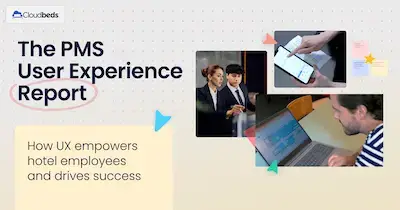
By Cloudbeds
Throughout their stay, each guest will interact with your front office staff either virtually or in person, making it one of the most important places within your property.
Therefore the way in which your staff handles these interactions can be a brand differentiator. It’s where first impressions are made and can set the tone for the entire guest experience. Having the right front office tools and procedures can help prepare your staff for whatever comes their way.
Key front desk operations responsibilities
Working the front desk is a nonstop job that requires staff to multitask and be personable with guests. To ensure that front desk staff don’t get overwhelmed while on shift, it’s important to streamline your front office operations. Identify key responsibilities to ensure you have the resources in place for smooth hotel operations.
Key responsibilities often include:
- Reservations – creating direct reservations, group reservations, cancellation requests, overbookings
- Guest arrivals and departures – conducting check-ins, early/late checkouts, room allocations, guest luggage storage
- Guest requests – including room moves, room service, car services, package deliveries, upselling additional services
To keep track of these responsibilities and more, check out our front office standard operating procedures ebook, which includes dozens of hotel front office checklists, resources, and tips and tricks.
Read on to learn about five easy ways to optimize your front desk operations today.
1) Divide front desk tasks by priority
As identified above, a lot goes into a hotel’s front desk operations. Your front office department will prioritize tasks differently depending on your property type. For example, large hotels will optimize for speed, while smaller boutique hotels may optimize for customer experience.
To determine what to prioritize, you first need to understand your target audience. If you cater to hotel business travelers, efficiency and professionalism will be key priorities. If you cater to families, look for ways to create fun, memorable experiences.
Your staff should be aware of their responsibilities and understand their priorities before their shift. Consider documenting roles and responsibilities within your department and the priorities that align with each.
2) Create daily checklists
Your front office manager should be responsible for creating daily checklists to coordinate activities for their front office staff, having checklists in place helps to create routines and keeps staff members organized.
Depending on the size of your team and the amount of turnover your property experiences, it may be helpful to have team members check off and submit these checklists at the end of each shift. A night audit can also be useful to ensure checklists are consistent.
For example, daily checklists are essential if you run a hostel that employs volunteers. However, if you employ more experienced staff members familiar with the hospitality industry, a checklist may just be there to serve as a helpful reminder and reinforce your property’s specific procedures.
There are at least 10 different reports that front office managers should keep an eye on daily to ensure smooth front desk operations.
The following are a few checklists that hotel management may consider implementing.
Arrival checklist
Arrival reports are critical to ensure proper staffing and employee assignments. Your front desk agent should clearly understand all your guest information, when they are arriving, their room status and number, projected arrival time, and any special notes or requests pre-arrival to ensure a smooth guest experience.
To make sure that your hotel staff is prepared for your incoming guests, download our guest registration and check-in checklist.
Departure checklist
Depending on your property’s checkout process, you may require more or less front desk interaction. If you have express checkout and don’t require guests to talk to your team before they depart, ensure that all accounts are settled before the end of the day.
Daily events, activities, and holidays checklist
Based on where your property is located and the types of hotel guests you host, a daily events checklist may be important for you to implement. Hotels that host many conferences, weddings, or other special events should track each one on a calendar and have a corresponding checklist with tasks for different departments of the hotel.
3) Continuously train your front desk staff
Hoteliers should empower their front office department by providing continuous training and support. Having a well-documented plan to train new hires on your processes is critical, however, continuous training plans and documentation are also important to make sure that your staff is prepared to make decisions on the fly and respond professionally to any situation.
Look into professional training opportunities around client communication to improve guest service, time management to increase efficiency, and leadership to build a team that can grow with your property.
With high turnover rates in the hotel industry, it can be beneficial to document standard operating procedures (SOP) to keep staff aligned. Well-defined SOPs help train your staff properly to deliver the best guest experience safely and efficiently.
4) Make changes over time
To ensure you have the best front desk operations in place, you should continually optimize your processes. Talk to your front and back office hotel staff to see how the departments work together. What needs to be changed? What’s working well?
As your front desk staff becomes more familiar with the guest cycle, they will identify gaps that need to be filled with new or different processes.
Additionally, guest behaviors and priorities are constantly changing and require hotels to adapt. Today, guests expect a frictionless experience and look to hotels to have digital processes such as mobile check-in or online concierge services to use at their leisure.
To improve guest satisfaction, constantly evaluate new technologies and services that may appeal to your target audience.
5) Use top software and modern applications
Running a property today requires more sophisticated products and software to attract travelers and make your guest’s stay seamless from beginning to end.
Managing occupancy and pricing on multiple distribution channels, incoming bookings, credit card payments, guest communications, reviews, and more requires a comprehensive platform to support all of these functions.

Modern technology to consider for your property
A modern, cloud-based property management system (PMS) is an important investment to make as the core of your property’s technology infrastructure. A PMS with an open API allows you to integrate applications that guests value as they are introduced to the marketplace.
Technology trends that are appearing across properties today include:
- Self-service check-in apps to speed up the check-in process and provide a contactless option for guests
- Keyless entry with encrypted access codes to conserve money and time associated with physical room keys or cards
- Mobile concierge for guests to access property information, local recommendations, and more.
- Chatbots that leverage artificial intelligence to answer questions for guests and route information to the correct department
In this snippet, Nuria Bernat, Director of Operations at Sweet Accommodations, describes how digital check-in is helping her properties increase efficiency and enhance the guest experience.
Implementing automation throughout your property is vital in not only improving the guest experience but also the employee experience. With technology to support daily operations and reduce the manual workload required by your front office staff, they will have more time to spend with guests, creating memorable experiences that will leave a lasting impression.




















